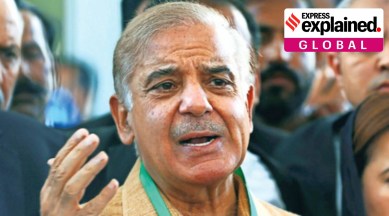Has Shehbaz Sharif really sued for peace with India? Here’s what to make of Pakistan PM’s statement
As Shehbaz Sharif has drawn in a third country to which Pakistan is beholden for periodic economic bailouts and whose relationship with India can be described as excellent, his comments would appear to hold more significance than routine statements about wanting peace with India.

In an interview to Dubai-based Al Arabiya, Prime Minister Shehbaz Sharif said that Pakistan wanted “serious and sincere talks” with India, and that he had asked Sheikh Mohamed bin Zayed, the President of the United Arab Emirates, to use his friendly ties with New Delhi to bring the two sides to the table to discuss all outstanding issues — Sharif mentioned the “human rights violations in Kashmir”, and India’s revocation of the special status of J&K.
As he has drawn in a third country to which Pakistan is beholden for periodic economic bailouts and whose relationship with India can be described as excellent, Sharif’s comments would appear to hold more significance than routine statements about wanting peace with India.
The timing of the remarks is also important. They come amid reports of Pakistan nearing a situation akin to that of Sri Lanka, with its dollar reserves running low and concerns rising that it might default on its debts. During his two-day visit to the UAE last week, Sharif asked Pakistan’s “brother” country for help one more time. The UAE has promised to roll over a $2 billion debt, and has topped that up with another $1 billion.
Separately, the Saudi Fund for Development has agreed to chip in with $1 billion on overdue payments for Pakistan’s oil imports from that country.
Sharif’s visit followed closely after a tour of both countries by Army chief Gen Asim Munir. The general, while praising the UAE and Saudi for coming to Pakistan’s help “like a brother”, also said Pakistan could not keep holding out its hand for a dole, and had to learn to stand on its own feet.
Not an unfamiliar line
Sharif’s reachout to Prime Minister Narendra Modi in the Al Arabiya interview included what sounded like an apparent condition: Pakistan wants “to live in peace with India provided we are able to solve our genuine problems” — “to resolve our burning issues like Kashmir where flagrant human rights are taking place day in and day out, and two, they (India) reversed whatever semblance of autonomy was given to the Kashmiris in their Constitution through article 370, they have revoked that, and minorities are being grossly mishandled…this must stop”.
He did not spell out exactly what he was asking India to do, although in earlier backchannel conversations, Pakistan had reportedly indicated that the restoration of J&K’s statehood was a requirement. Pakistani journalists Javed Chaudhry and Hamid Mir recently revealed that it had been agreed in these backchannel conversations to “freeze the Kashmir issue” for 20 years.
Pakistan’s Prime Minister has made similar remarks earlier. Both he and his brother, former Prime Minister Nawaz Sharif, have consistently said that Pakistan has to make peace with India, and that normalising ties would benefit Pakistan’s economy.
However, this is the first time that a Pakistani leader has specifically said that “Pakistan has learnt its lessons” from its three wars with India, which had only brought “more miseries, unemployment, poverty”.
Pak Army’s position
The last time the Army made substantive remarks on relations with India was when its former chief Gen Qamar Javed Bajwa (retired) made a strong case for trade between the countries in a landmark speech in 2021 — pitching for “geoeconomics” rather than geostrategy.
The only remark that Gen Munir, who took over from Gen Bajwa on November 29, 2022, has made on India came during a tour of the LoC — if attacked, Pakistani forces would “defend every inch of our motherland”, he said.
A clarification on Sharif’s interview to Al Arabiya, issued post-haste from the Prime Minister’s Office on Tuesday, stressed that the reversal of India’s “illegal actions” in Kashmir was a non-negotiable precondition. This suggests that the Pak Army may not have taken kindly to the PM’s remarks, especially the “lessons-learnt-from-three wars” part of it — as this points directly to the Army’s mistakes, and to its role in setting up an agenda of hostility with India.
“Without India’s revocation of this step [in Kashmir], negotiations are not possible,” the Pak PMO said in its clarification.
Assessment of statement
So what do we make of Prime Minister Sharif’s statement?
Over the past few years, Pakistan’s economic difficulties have prompted a greater acceptance of the idea of normalising relations with India. Changes in West Asian geopolitics have seen Pakistan’s “brothers”, the UAE and Saudi, draw closer to India — and these two key players of the region have also pushed this shift.
The political and military leadership of Pakistan also know that India will not revoke its August 2019 actions in J&K, and that the maximum concession in this context would be a restoration of statehood.
What remains is for both to convince their constituencies that normalising relations with a country that most Pakistanis continue to describe as “dushman humsaya” is no longer an option, but a necessity.
The Imran Khan-Bajwa combination tried and failed, as elements within the establishment scuttled a planned move to restart some trade between the two countries.
How Sharif’s statements play out politically, and how the Army responds in the coming days, will provide a clearer picture.
Seasoned observers in India are also sceptical about the “lessons” that Sharif claims Pakistan has learnt. In the past, military and civilian leaders have spoken eloquently about the blowback that Pakistan had to suffer for nurturing militant groups to achieve its regional strategic objectives, but this did not prevent the Pakistan Army from pushing on with getting the Taliban back in power in Afghanistan.